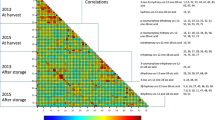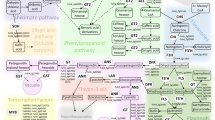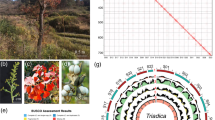Abstract
THE major polyphenoloxidase substrate responsible for the blackening of the fruit of the banana has been identified1 already as 3,4-dihydroxyphenylethylamine. Although the original work was carried out using material of the clones Gros Michel and Mysore, a range of clonal varieties was investigated afterwards to determine whether this substrate was responsible for blackening in other clones or whether other phenolic compounds were implicated in the blackening reaction.
This is a preview of subscription content, access via your institution
Access options
Subscribe to this journal
Receive 51 print issues and online access
$199.00 per year
only $3.90 per issue
Buy this article
- Purchase on Springer Link
- Instant access to full article PDF
Prices may be subject to local taxes which are calculated during checkout
Similar content being viewed by others
References
Griffiths, L. A., Nature, 184, 58 (1958).
Simmonds, N. W., Bananas (Longmans, London, 1959).
Simmonds, N. W., and Shepherd, K., J. Linn. Soc. Lond. Bot., 55, 302 (1955).
Author information
Authors and Affiliations
Rights and permissions
About this article
Cite this article
GRIFFITHS, L. Relationship between 3,4-Dihydroxyphenyl-ethylamine Content and the Genome, acuminata. Nature 192, 84–85 (1961). https://doi.org/10.1038/192084a0
Issue Date:
DOI: https://doi.org/10.1038/192084a0
This article is cited by
-
Toxische Inhaltsstoffe von Nahrungspflanzen
Die Kulturpflanze (1968)
Comments
By submitting a comment you agree to abide by our Terms and Community Guidelines. If you find something abusive or that does not comply with our terms or guidelines please flag it as inappropriate.



